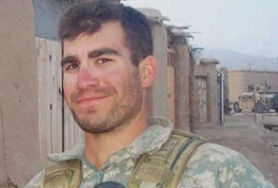 7m
7mAfghanistan: soldiers tell the real war story
We all heard the boom, but didn’t know what it had done. An hour later, it was clear from the sullen faces in the base headquarters, it had meant the worst.
The skyline around the 82nd Airborne’s base, COP Winklemann, is a regular cacophony of dull thuds, echoing bangs and loud pops. It’s IED country – the improvised explosive devices that kill so many here.
But that morning, the normal backdrop brought with it the worst news that this unit had had in nine months – and it came in the closing four weeks of their deployment.
The boom was caused by the IED that killed Sergeant Brian Piercy outright – the 1,111th casualty of America’s war here. He had been leading his men on a patrol, and came to a corner of the road where a large home made device had been laid.
The device itself was detonated by what they call a command wire. This means the insurgent lies in wait and triggers the device when they choose.
When the unit got there to support the platoon under fire, they followed the command wire. It went on and on to the point they could no longer follow it. These things are often booby traps themselves.
The atmosphere in the unit – obviously – changed massively. There is exhaustion in everyone’s face. A lot of anger. A need for some privacy and the thought, that you heard repeatedly.
Sergeant Brian Piercy
Staff Sgt. Brian F Piercy, from Clovis, California, was 27.
He died on July 19 in Arghandab River Valley, Afghanistan, from injuries sustained when insurgents attacked his unit with an improvised explosive device.
He was assigned to the 2nd Battalion, 508th Parachute Infantry Regiment, 4th Brigade Combat Team, 82nd Airborne Division.
His death was the 1,111th for US forces since the start of operations in Afghanistan in 2001.
That it happens all the time, but this was different – Sergeant Piercy was a friend. (One of the basic flaws of the embed system is that at times like this, the openness you often see from the US Army about their procedures, evaporates. They’re on the defensive, and you have to carefully navigate their sensitivity at that time. After all, these men would in the coming weeks be the guns we relied on to keep us safe as we went on patrol.)
The week we then spent with Sgt Piercy’s friends was one lived in the shadow of his loss. They took us to Kuhak schoolhouse, a remarkable building replete with Oxfam classroom benches, that the US Army had to remove 22 separate IEDs from when they first got there. The fields around the base are still so heavily mined – from this conflict and the last – that they’re off limits.
The men insisted that revenge never dictated their operations, but you could smell the anger that drove their daily routine. But this was under laid with a restraint born of the knowledge they knew they would probably never catch the men who laid the IED. That they could kill all the wrong people if they got out of control. That the insurgents they face in ambushes and firefights are rarely the bomb makers. That a bomb maker is most likely to be killed by his own devices, if he proves to be not a very good maker of bombs.
Every day we would patrol, and every day they would hope to ambush someone. But it was not the search of violence that proved the most unnerving. It was, in the light of a death so recent and raw from an IED, the omnipresent threat of a bomb, everywhere you tread.
Inside the orchards, the dense and shaded groves where so many patrols take place, we saw how impossible that threat is to navigate. Look under your feet. Look to the walls to either side. They could all contain bombs. But don’t forget to look upwards – the latest place for bombs is in the trees. There is genuinely no escape.
The men, led by Sergeant Aaron Best, a square jawed man of 27 months hard fighting in Afghanistan, together with two other sergeants, Adam Morris and Mike Herrmann, shared their neurosis, their confusion, their disenchantment.
Sgt Morris’s inability to get the image of how his friend died out of his mind: “A body’s not supposed to be broken apart that way”.
Sgt Herrmann’s admission you can’t ever tell where the next bomb could come from: “You literally are the most paranoid person in the world while you’re out there. You dunno where it’s gonna come from. Pre-deployment training they tell you, look for upturned dirt. There’s upturned dirt everywhere. Look for markers in the trees – there are markers in the trees everywhere.”
And Sergeant Best’s disenchantment after four years: “I’ve been here every year since 2007. I came here in 2007 I was getting shot up, blown up, losing friends, and I come back here on 2010 I’m getting shot at, blown up, losing friends. I’ve been here four years and nothing has changed.”
At the close of their tour, the abiding feeling was one of the insurmountable challenge that they had faced, sullied, perhaps, with the knowledge that once they got home, they would have to go over it all, again and again, in the privacy of their lives to come.
 Sergeant Brian Piercy
Sergeant Brian Piercy